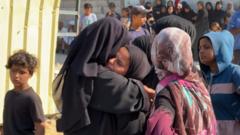In an effort to alleviate the dire humanitarian situation in Gaza, the Israeli Defense Forces (IDF) have declared the establishment of corridors to facilitate the delivery of aid through United Nations convoys. This development follows increasing global demands for more accessible aid, as relief organizations report alarming levels of starvation within the enclave.
Israel Initiates Humanitarian Corridors for Gaza Amidst Aid Crisis

Israel Initiates Humanitarian Corridors for Gaza Amidst Aid Crisis
Israel announces plans to open humanitarian corridors and resume aid air drops to Gaza in response to international pressure.
The IDF's statement revealed that the first air drops have already occurred, consisting of essential supplies such as flour, sugar, and canned food, totaling seven pallets. This aid initiative comes as humanitarian organizations voice concerns over mass starvation, with reports indicating that individuals are succumbing to hunger-related illnesses.
Furthermore, the IDF articulated its commitment to enhancing humanitarian responses, confirming plans for possible pauses in combat operations in densely populated areas to allow for aid distribution. The Israeli military also rebutted accusations of systematic starvation tactics in Gaza, despite compelling evidence to the contrary.
In an additional move to address the humanitarian crisis, Israel has reestablished power supplies to a vital desalination plant benefiting approximately 900,000 residents in Gaza. However, the responsibility for food distribution has been placed squarely on the shoulders of the UN and international aid organizations, with the IDF emphasizing the necessity to prevent aid from reaching Hamas.
Since cutting all supplies to Gaza earlier in March, Israel had allowed some aid to flow back in starting in May, attributing the plight of civilians to Hamas. According to the Gaza health ministry, over 125 casualties stemming from malnutrition have been reported, including a heartbreaking count of 85 children.
Furthermore, the IDF articulated its commitment to enhancing humanitarian responses, confirming plans for possible pauses in combat operations in densely populated areas to allow for aid distribution. The Israeli military also rebutted accusations of systematic starvation tactics in Gaza, despite compelling evidence to the contrary.
In an additional move to address the humanitarian crisis, Israel has reestablished power supplies to a vital desalination plant benefiting approximately 900,000 residents in Gaza. However, the responsibility for food distribution has been placed squarely on the shoulders of the UN and international aid organizations, with the IDF emphasizing the necessity to prevent aid from reaching Hamas.
Since cutting all supplies to Gaza earlier in March, Israel had allowed some aid to flow back in starting in May, attributing the plight of civilians to Hamas. According to the Gaza health ministry, over 125 casualties stemming from malnutrition have been reported, including a heartbreaking count of 85 children.


















